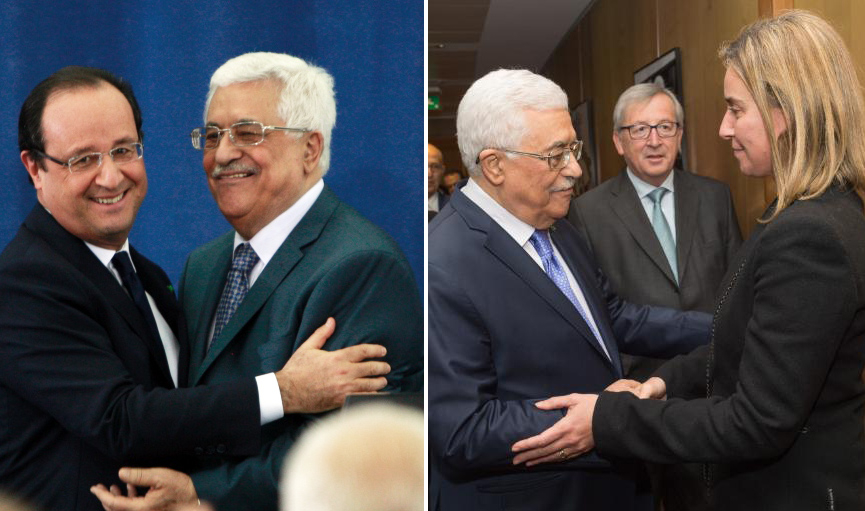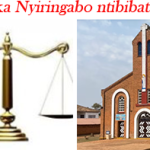The Palestinian Authority’s endless threats to suspend security coordination with Israel are a carefully crafted bluff designed to extort more funds from Western donors, scare the Israeli public and provide a cover for its refusal to talk peace with Israel.
Many Palestinians say these threats are also intended for “internal consumption” — namely to appease Hamas and other radical factions and to refute charges that the Palestinian Authority (PA) is betraying its people by “collaborating” with Israel.
Hamas has conditioned “reconciliation” with President Mahmoud Abbas’s ruling Fatah faction in the West Bank on Fatah ending all forms of security coordination with Israel. Hamas claims that the security coordination is directed mostly against its members and supporters in the West Bank.
Over the past several years, PA security forces have rounded up hundreds of Hamas men in an attempt to prevent the Islamist movement from establishing bases of power in the West Bank.
Hardly a week has passed during the past few months in which a senior Palestinian Authority official does not threaten to cut off security ties with Israel. Some officials in Ramallah have even claimed that the PA has already taken a decision to suspend not only security coordination with Israel, but also political and economic relations as well.
PA officials are saying that their threats, which until now have been so much dust in the wind, will be realized next month.
“April is going to be the turning point,” declared Jamal Muheissen, member of the Fatah Central Committee. “This is a month that will witness changes with regards to several issues that can no longer be delayed or marginalized. April will witness the complete and public suspension of security coordination [with Israel]. This will be the first step taken by the Palestinian leadership.”
This sounds curiously familiar: nearly a year has passed since leaders from the Palestinian Authority and Fatah first announced their decision to halt all forms of security coordination between the PA and Israel.
Meeting in Ramallah last month, the leaders once again reaffirmed their decision. This time, it is allegedly Israel’s “failure to honor all signed agreements with the Palestinians” that prompts them to suspend security coordination.
U.S. Vice President Joe Biden was reportedly informed of this intention earlier this month while visiting Ramallah.
But Biden is not the only Western leader to be privy to this threat. Palestinian sources say that foreign dignitaries and leaders who visit Ramallah have become accustomed to hearing Abbas and other Palestinian leaders announce their “intention” to suspend all relations with Israel, including security coordination.
Moreover, the PA recently leaked to the Palestinian media that it has officially notified Israel of its decision to “limit” all relations with it. According to the unconfirmed report, President Mahmoud Abbas dispatched three senior officials — General Intelligence Chief Majed Faraj, Preventive Security Chief Ziad Hab Al-Reeh and PA Minister for Civilian Affairs, Hussein Al-Sheikh — to a meeting with Israeli officials to brief them about the reported decision.
The Palestinian street, however, takes a different view of these threats. The reports, they say, call to mind President Abbas’s incessant threats to resign.
These Palestinians consider the threats a smokescreen to conceal the continued security coordination with Israel which, they say, seems even to have increased in recent months. They say that President Abbas can probably fool Western leaders with these threats, but not his people, who have become used to hearing empty threats from their leaders.
A senior Fatah official in Ramallah summed up the Palestinian Authority’s dilemma: “We are facing a complicated crisis. If we carry out the threat [to suspend security coordination with Israel], we will suffer; similarly, if we don’t we will suffer.”
The situation, however, is not all about money: it is also about power. President Abbas and his security chiefs know perfectly well that the security coordination benefits them first and foremost. They are well aware that without Israel’s help, Hamas would spread in the West Bank like a cancer, ultimately overthrowing the PA and replacing it with another Islamist regime like the one in the Gaza Strip.
It is helpful to remember Abbas’s moment of lucidity, when in 2014, in front of a visiting Israeli group, he declared that security coordination with Israel was “sacred.” He added: “We will continue with it even if we differ on political matters.”
For a change, Abbas was being honest. And he is right. For Abbas, security coordination is indeed “sacred”: it is keeping him in power and stopping Hamas from taking over the West Bank. Hence the security coordination — in Abbas’s words — is very important for the Palestinian Authority – perhaps more than thwarting Hamas terror attacks against Israel.
Abbas has a problem. He cannot tell his people that security coordination with Israel is what is keeping him on the throne. The sacredness of security coordination is a topic for Israeli ears only.
So what are the threats about? Money.
Here is Abbas’s take-home to the world: “Send more money or we will cut off security cooperation with Israel.” And now there is a little added value, messaged mostly to the U.S. and EU: Convene an international conference for “solving” the Israeli-Palestinian conflict, or we will cut off security cooperation with Israel.

Abbas to the world: “Send more money or we will cut off security cooperation with Israel.” |
Whatever else he is, Abbas is not suicidal. Halting security coordination with Israel would spell both his end and the end of the Palestinian Authority in the West Bank. What the international community is hearing, then, is nothing more than a new version of the old bid for yet more political concessions and yet more cash.
Khaled Abu Toameh, an award winning journalist, is based in Jerusalem.


















